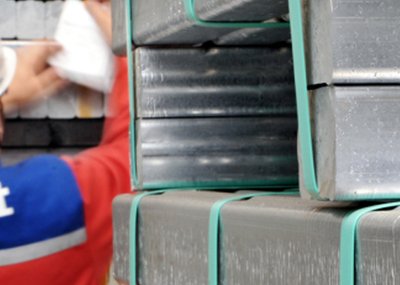Trimet Aluminium SE increased its sales of aluminum products in the 2015/2016 fiscal year (June 30). Some 3,000 employees at eight locations produced approximately 775,000 tons of aluminum and cast iron products, five percent more than last year. The Trimet Group closed the financial year with a consolidated turnover of 1.7 billion euros. In the current financial year, the materials specialist continues to invest in sustainable growth in order to serve the increasing demand for high-quality aluminum products and test the flexibility of the manufacturing process. With an equity ratio of 60 percent, the independent family-owned company has a solid basis for action.
The capacities of the aluminum smelters, foundries and refineries were fully utilized in the 2015/2016 fiscal year. The expansion of production capacity and plant modernization measures, in which the family-owned enterprise has invested a total of 84 million euros, came to fruition. Despite persistently low global market prices for aluminum, the Trimet Group achieved a slightly improved adjusted result of 63 million euros compared to last year. This was driven in particular by higher production volumes at Trimet locations in France.
“We will continue our policy of qualitative growth. With continuous investments at all production locations, we are optimally positioning ourselves to face the rising demand for aluminum and are constantly improving our production efficiency. Through the further development of production facilities and the tighter integration of our locations, we can more flexibly serve the current demand, secure long-term jobs and maintain our position as a provider of high-quality aluminum products for all stages of the material chain,” said Dr. Martin Iffert, CEO of Trimet Aluminium SE.
Vehicle construction continues to drive growth
The continuing trend toward weight reduction in automotive construction continues to ensure new applications for the light metal aluminum and increase volume requirements. In addition to the classic drive train with engine blocks, transmission and clutch housings, aluminum is increasingly being processed in structural parts and components for electric mobility, including battery casings. This is coupled with the growing demand for specialty wires for connecting elements and electrical applications. Trimet was able to strengthen its position as a system supplier to renowned automakers and their suppliers.
In the current fiscal year, Trimet is investing heavily in the modernization and optimization of its production facilities. “We have nearly completed the integration of locations acquired in recent years,” said Iffert. “Now it’s time to further develop the manufacturing process, in addition to continuously improving production systems and materials development.”
Load shifting contributes to solving the energy transition
Until now, the production of aluminum has required a constant supply of energy around the clock. In recent years, Trimet has developed a process that makes use of flexible load shifting, thereby adjusting the electrolysis process to fluctuating amounts of electricity from wind and solar energy. Following completion of the test phase, Trimet will now test the process on an industrial scale. By the end of 2017, all 120 furnaces in an electrolysis hall of the aluminum smelter in Essen will be converted. The company will be investing around 36 million euros over the next two years to this end. “We are taking on a globally pioneering role in terms of improved flexibility in aluminum production. We want to make a significant contribution to solving the energy transition and simultaneously prove that industrial production and a climate-friendly energy supply are not only consistent, but can even be mutually supportive,” said Iffert. “Aluminum is closely linked to climate protection: light weight, energy efficiency and recyclability make it the ideal material. With improved flexibility in the manufacturing process, we want to add a further climate-friendly attribute to the product.”
Family-run company focuses on continuity
Trimet considers itself well positioned for the future and also expects qualitative growth for the current fiscal year. Here, the family-owned enterprise is focusing on continuity, even after the death of Heinz-Peter Schlüter. The founder and owner of Trimet died in November 2015. “His untimely death is a grievous loss for the company that he built and whose special spirit he forged,” said Iffert. “Schlüter himself ensured several years ago that the future of Trimet as an independent family-run company would be secure. This is also a value shared by the owner family, which is very committed to and for Trimet.”
As an innovative, medium-sized company, TRIMET Aluminium SE develops, produces, recycles, casts, and sells modern light-metal products made out of aluminum at eight locations. A total of 3,000 employees ensure, together with our customers, that automobiles are more economical, aircraft are lighter, wind turbines and electricity plants are more efficient, buildings are more modern, and packaging is more ecological.
Source: Trimet
×


